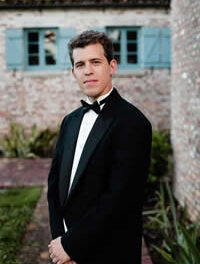On December 11, War Memorial Auditorium’s stage was packed with members of the Greensboro Oratorio Society, and a friend commented that it was heartwarming to see such a large gathering of people motivated exclusively by their love of music. They’re mostly amateurs who pay fees to defray the costs of scores, engaging a small orchestra, etc., and they spend hours rehearsing under the direction of conductor Jay O. Lambeth for an annual performance of Handel’s Messiah, open to all for donations only. This annual gift to the city has been going on since 1954. The diverse nature of the large audience fulfilled the Society’s intention that the concert be available to everyone. With the ever-increasing cost of classical concerts, a substantial portion of the public can no longer afford to attend performances.
Only about a third of the Society’s large chorus consists of men’s voices so it is fortunate that they projected lustily. The sections were well balanced during the performance. Lambeth had prepared the ensemble very well, so all the texts were clearly articulated, whether the tempo was slow or fast. A complete Messiah , such as that performed at Duke Chapel, runs about three hours. The GOS makes a sensible two-hour abridgement that retains everyone’s favorite arias and choruses. Being used to Triangle performances that have long been influenced by correct musicological editions, we were surprised to hear and see a clarinet in the small ad hoc chamber orchestra. Thanks to UNC’s Tonu Kalam for bringing me up to speed: Mozart re-orchestrated Messiah , adding clarinets, but I had not realized that this “corruption” was retained in the standard G. Schirmer edition used by the GOS. Although Handel did not use them in this oratorio, the first recorded use of clarinets in classical music occurred in Handel’s opera Tammerlano – in 1724. Messiah was composed in 1741!
Lambeth had a good group of professional soloists, all of whom enunciated well. Agility and even tone were characteristics of tenor David Holley’s performance, from the soothing “Comfort Ye My People” to the dramatic “Thou Shalt Break Them.” Bass John Williams’ rich and burnished tones are familiar to Triad and Triangle listeners and were much in evidence throughout the concert. Much of the story was told in arias sung by soprano Nancy Walker; these were phrased and projected effectively. In comparison to her colleagues, mezzo-soprano Hallie C. Hogan had a slightly weaker projection, but her delivery of the text was clear. Since this was not apparent during her recital at Elon University last fall, perhaps she was recovering from the flu or suffered from the hall’s uneven acoustics. In his duet with her, “O Death, Where Is Thy Sting?,” Holley scaled down his voice. There was relatively little ornamentation of the repeats.
Lambeth’s small orchestra played from a shallow pit. The “harpsichord” was an electric synthesizer, adequately audible and played with restraint by Robert Winsor. Timpanist Michael Haldeman was outstanding. Alas, “The Trumpet Shall Sound” was perhaps too literally true: it began on the knife-edge and quickly went “aft a-gley.” The lovely “Pastoral Symphony” went by unnoticed because buckets were being passed for contributions to help defray costs. The audience applauded every aria and chorus, there was a lot of flux with people coming and going throughout the performance, and cell phones abided there too!
At intermission, Orson Scott Card read Greensboro Mayor Keith Holliday’s proclamation saluting the organization’s 50-year tradition. Also honored was oratorio singer Thelma A. Greeson, the last veteran of the GOS’s very first Messiah ; she has sung in every performance since then. Brava!











